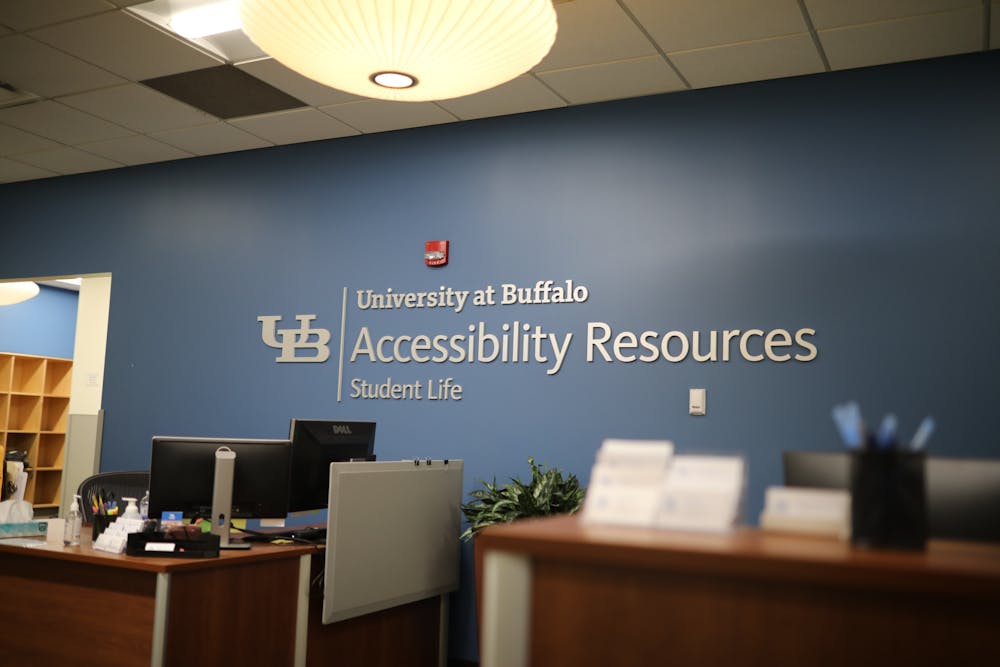UB provides multiple services and accommodations for 2,200 students with disabilities.
But what are these services? How do students access them? Where can students report violations?
Find the answers to those questions and more in The Spectrum’s guide to disability services and accommodations at UB:
Requesting an accommodation
Students can request an accommodation for permanent conditions or temporary injuries by contacting the Accessibility Resources Office.
Some of the accommodations offered include:
- Testing accommodations
- Assistive equipment
- Accessible textbooks
- Extended time for testing or a distraction-reduced environment
- Computer-based captioning to transcribe classroom dialogue
- Note-taking technology
- American Sign Language interpretation
- Classroom seating arrangements
- Snow removal for their route to class
Specific UB departments have accommodations too. UB Information Technology (UBIT) has wheelchair accessible workstations and computers with specialized software. Additionally, students can apply for housing accommodations, such as modifications to living spaces, through Housing Services.
“Accommodations are not ‘cookie-cutter,’” Kristin Harte, Director of Accessibility Resources said in an email to The Spectrum. “[They] are tailored to the student needs to create equitable access without reducing the educational experience and expectations of all UB students.”
Next, Accessibility Resources (AR) will determine whether the accommodation request is reasonable. AR makes that determination based on “your disability experience, any barriers you encounter to learning activities, any barriers you encounter to participation on campus, [and] your past experience with effective and ineffective accommodations.” Students are the “first source” to ask for accommodations they feel necessary. Therefore, students’ experiences are their strongest advocate.
If a student’s accommodation is determined to be reasonable, they will be given an accommodation memo. Students need a new memo each semester. If their needs have not changed, they can contact AR for an updated accommodations memo. Finally, students must inform their instructors of their accommodations. And teachers cannot deny accommodations.
“The type of accommodations we provide are on an individual basis,” Harte said. “We may have students with the same disability, but the barriers to access they experience are different, so we listen to students and work with the barriers they personally experience to their academics and create a plan with the student to what accommodations they may need.”
Recognizing and reporting violations
According to the Reasonable Accommodation Policy, instructors may not deny a recommended or requested accessibility aid that is recommended in writing by AR. Instructors also aren’t allowed to request medical documentation from students or ask questions about a student’s disability or possible disability.
Instructors must contact AR if they have questions in regard to a student’s requested accommodation. If students believe this policy was violated, they can contact the New York State Division of Human Rights, the U.S. Equal Employment Opportunity Commission’s Buffalo office, or the Department of Education's Office for Civil Rights.
Faculty can see how accessible their content is on UB Learns, but they’re not required to make it more usable for people with disabilities.
“In cases where information is not accessible, UB’s EIT Accessibility Officer will work with faculty to remedy any accessibility issues and ensure that students receive timely and effective access to course materials,” Sharon Nolan-Weiss, Director of the Office of Equity, Diversity and Inclusion said.
Students can also report broken or non-functioning amenities like door operators to University Facilities Customer Service at (716) 645-2025. Director of Facilities Operations Jeffrey Angiel told The Spectrum that they typically respond within two days.
New touchless door operators are being used across campus. Currently, at least four of these “buttons” don’t work in One World Cafe and Capen Hall.
Sarah Owusu is an assistant news editor and can be reached at sarah.owusu@ubspectrum.com

Sarah Owusu is an assistant news editor at The Spectrum. In her free time she enjoys reading, baking, music and talking politics (yes, shockingly). She'll also be her own hairdresser when she needs a change.





